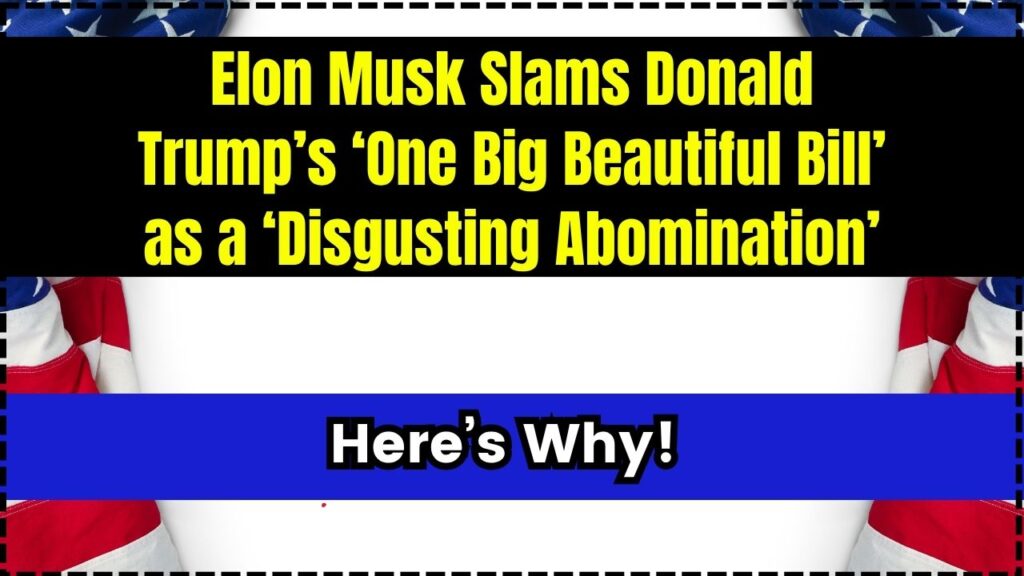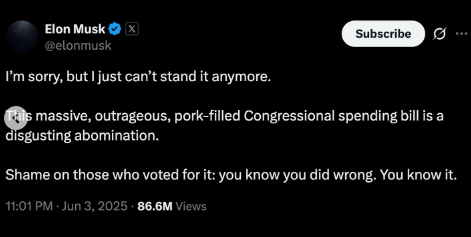
Elon Musk Slams Donald Trump’s ‘One Big Beautiful Bill’ as a ‘Disgusting Abomination’: In a dramatic shift in the political landscape, tech mogul Elon Musk recently criticized former President Donald Trump’s “One Big Beautiful Bill” (OBBB), calling it a “disgusting abomination.” Musk’s harsh words have sparked a debate that stretches beyond politics, touching on fiscal responsibility, government inefficiency, and the future of American legislation. This bill, which promised sweeping changes across various sectors, including defense, social programs, and tax cuts, has divided lawmakers and citizens alike. Let’s break down the controversy, what’s at stake, and what it means for the future of U.S. politics.
Elon Musk Slams Donald Trump’s ‘One Big Beautiful Bill’ as a ‘Disgusting Abomination’
The One Big Beautiful Bill is a polarizing proposal that has sparked intense debate about the future of U.S. fiscal policy. While some argue that the bill will stimulate the economy through tax cuts and increased defense spending, others, like Elon Musk, warn that it will add trillions to the national debt and worsen government inefficiency. As lawmakers continue to grapple with the bill’s provisions, it’s clear that its passage could shape U.S. fiscal policy for years to come.
| Key Point | Details |
|---|---|
| Bill’s Purpose | A massive proposal to overhaul the U.S. budget, cutting taxes, boosting defense spending, and slashing social programs. |
| Musk’s Criticism | Musk condemned the bill for increasing the federal deficit by $2.5 trillion and undermining his efforts to reduce government inefficiency. |
| Fiscal Impact | The bill is projected to add over $2.5 trillion to the national debt. |
| Political Backlash | Musk’s criticism resonates with fiscal conservatives, but sparks disagreement with Trump’s supporters. |
| Provisions in the Bill | Includes tax cuts, a $350 billion increase in defense spending, and cuts to programs like Medicaid. |
| AI Regulation Moratorium | The bill also proposes a 10-year pause on state-level AI regulations. |
What is the “One Big Beautiful Bill”?
The “One Big Beautiful Bill” is a large-scale legislative proposal put forward by former President Donald Trump. Its core premise was to make significant changes to the federal budget, aiming for deep cuts in taxes and a major increase in defense spending. At the same time, the bill proposed reductions in social programs like Medicaid, SNAP (Supplemental Nutrition Assistance Program), and others, which many argue could hurt low-income families.
But what really set off a firestorm of criticism, particularly from Elon Musk, was the bill’s projected impact on the federal deficit. Musk, known for his straightforward opinions and outspoken critiques, publicly referred to the bill as a “disgusting abomination,” arguing that it would exacerbate the nation’s already significant debt problem. In Musk’s view, the bill was not only fiscally irresponsible but also went against the goals of his own initiatives to reduce government waste and inefficiency.
The Context: Elon Musk Slams Donald Trump’s ‘One Big Beautiful Bill’ as a ‘Disgusting Abomination’
For most people, the discussion of a budget bill might seem like a dry and distant issue. But the One Big Beautiful Bill is different. This bill is one of the most sweeping proposals in recent memory, and its implications could affect millions of Americans. The tax cuts proposed in the bill are aimed at both individuals and corporations, promising to reduce the financial burden on businesses and the wealthy.
However, the flip side is that these tax cuts would come at the expense of social programs that provide essential services to the most vulnerable populations. In an era where many Americans are already struggling with rising costs of living, healthcare, and education, these cuts could deepen economic disparities. For example, Medicaid provides healthcare coverage to low-income individuals and families. Slashing funds for this program could leave millions without access to necessary medical care.
The bill also includes a $350 billion increase in defense spending, which has sparked concerns about priorities in U.S. spending. While national security is undeniably important, critics argue that such a massive increase in military spending, particularly during a time of fiscal uncertainty, could further strain the nation’s finances.
Historical Context of U.S. Debt and Budget Bills
To fully understand why Musk’s comments are stirring such debate, it’s crucial to look at the historical context of U.S. debt and budget legislation. The United States has faced budgetary challenges for decades, with national debt reaching historic levels in the 21st century. The 2017 Tax Cuts and Jobs Act, for example, was another controversial tax overhaul that cut taxes while adding significantly to the federal deficit. Critics of that bill, like Musk now, argued that such policies would only increase the national debt without providing sustainable long-term benefits to the economy.
Similar budget bills have also come under fire for disproportionately benefiting wealthier Americans, with critics saying that such measures widen the gap between the rich and poor. Historically, the U.S. has had a mixed record when it comes to managing debt, with economic booms often followed by downturns that escalate the burden of federal borrowing.
Musk’s Influence on Public Policy
Elon Musk is not just a businessman; he has increasingly become a prominent figure in public policy discussions. Musk’s companies, like Tesla and SpaceX, play a significant role in the U.S. economy and in global technological advancements. As such, his voice carries weight when it comes to issues like government spending and regulation. Musk has often voiced concerns about government inefficiency and has advocated for policies that reduce unnecessary spending.
In this case, Musk’s condemnation of Trump’s bill reflects his broader concerns about government waste. Musk’s involvement in public policy debates underscores how influential tech leaders can be in shaping the direction of the country, particularly when it comes to matters like the federal budget and deficit management.

The Role of the Federal Reserve in Managing National Debt
Another key element in this conversation is the role of the Federal Reserve. The Fed plays a critical role in managing the national debt through monetary policy. It controls interest rates and implements measures like quantitative easing to help manage inflation and stimulate economic growth. However, critics argue that these actions only delay the inevitable reckoning of mounting national debt.
Musk’s concerns about the $2.5 trillion deficit stem from the notion that debt cannot continue to be ignored without serious consequences. While the Fed’s role is to stabilize the economy, if the debt reaches unsustainable levels, it could lead to inflation, higher interest rates, and an eventual economic crisis. This makes Musk’s criticism even more pertinent in today’s uncertain financial climate.
Public Opinion on the Bill
Polling data shows that the public is divided on the One Big Beautiful Bill. Many Americans, particularly those in the middle and lower income brackets, are wary of the potential cuts to programs that help vulnerable populations. Conversely, some individuals support the tax cuts and increased defense spending, believing that these measures will bolster the economy and national security.
For instance, a recent poll by Gallup found that 48% of Americans disapprove of deep cuts to social welfare programs, while 37% supported tax cuts, particularly for businesses. This reflects the polarizing nature of the bill, which has ignited a broader discussion about fiscal responsibility and the future of U.S. economic policy.
Provisions in the Bill: What’s Inside?
Let’s break down some of the major components of the bill:
1. Tax Cuts
The bill proposes deep cuts to corporate taxes and income taxes, aiming to stimulate the economy by leaving more money in the hands of businesses and individuals. However, the concern here is that tax cuts, especially for corporations, may not always result in reinvestment in the American economy. Critics argue that these cuts could primarily benefit the wealthiest, while leaving working-class families with little to no tangible benefits.
2. Defense Spending
There’s also a major push to increase military spending by $350 billion. The idea is to enhance national defense, but the question remains: at what cost? Critics argue that this massive increase could divert funds from more pressing needs, such as healthcare, education, and infrastructure.
3. Cuts to Social Programs
As mentioned earlier, the bill proposes significant cuts to vital social programs, including Medicaid and SNAP. These programs provide assistance to millions of Americans who need it most. A reduction in funding could result in fewer resources for the most vulnerable populations, including the elderly, children, and low-income families.
4. AI Regulation Moratorium
An interesting addition to the bill is the 10-year moratorium on state-level AI regulations. This provision has raised eyebrows, as it would halt state governments from implementing any new regulations on artificial intelligence. Critics worry that this could lead to unregulated AI development, which might not be in the best interest of society.
Trump Confirms Elon Musk’s Exit: Special Conference to Address Shocking Cabinet Departure
Why House Republicans Are Quietly Nervous About Trump’s ‘Big Beautiful Bill’
Trump’s ‘Big Beautiful Bill’: Will It Really Eliminate Taxes on Social Security?
Political Fallout: Reactions from Lawmakers

Musk’s criticism hasn’t just ruffled feathers within the Trump camp—it’s also stirred up Republican lawmakers, some of whom share Musk’s concerns about the bill’s impact on the national debt. For example, Representative Thomas Massie, a well-known fiscal conservative, has expressed his own reservations about the bill’s spending provisions.
However, Trump’s supporters are not easily swayed. Many believe that the tax cuts and defense spending are necessary to bolster the economy and secure the nation’s future. The debate over this bill is shaping up to be a major point of contention in the upcoming elections, as lawmakers on both sides of the aisle weigh in on the long-term implications of the proposed legislation.











